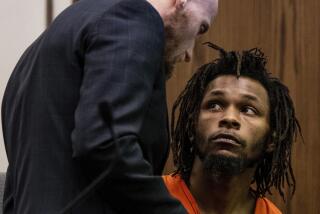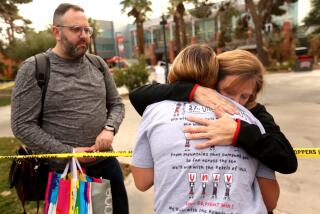Colorado theater shooting: New details emerge on James E. Holmes
- Share via
CENTENNIAL, Colo. – The first glimpse of a once-promising career beginning to unravel emerged Thursday during a hearing in the case against James E. Holmes, accused of killing 12 and injuring 58 in a packed movie theater last month.
Assistant Dist. Atty. Karen Pearson revealed that 24-year-old Holmes, once a doctoral student in an elite neuroscience program at the University of Colorado Denver, had failed oral exams on June 7, made unspecified threats serious enough for campus police to be notified, and had his access to university buildings on the Anschutz Medical Campus revoked. He withdrew from the university June 10.
Timeline: Mass shootings in the U.S.
She said such events may give a hint as to what would have set Holmes on the path to July 20, when he is accused of opening fire at an Aurora premiere of the latest Batman movie, “The Dark Knight Rises.” Holmes also is accused of booby-trapping his apartment, not far from the university campus, presumably to kill anyone who tried to enter.
During the weeks before the shooting, Holmes reportedly ordered an arsenal of weaponry delivered to his apartment and the university.
Holmes, 24, faces 24 murder charges -- two for each of the dead -- and a total of 142 criminal counts.
Photos: A tragic shooting and its aftermath in Colorado
In court Thursday, he seemed to be paying closer attention than previous appearances, often looking at Judge William Sylvester when the judge spoke.
“What is going on in the defendant’s life is extremely relevant to the case,” Pearson argued as she sought to review all of Holmes’ academic records – including grades, course schedules and admission application -- as well as emails to professors during the time he attended.
She speculated about how disappointed Holmes must have been about his deteriorating university career and said faculty had asked him to leave the program.
The prosecution had subpoenaed the university records, which were turned over to the judge last week. They remain sealed, and the defense wants to keep it that way.
Defense attorney Daniel King rejected Pearson’s rationale and the validity of the scenario she sketched out on Thursday, strongly opposing the release of information about his client’s time at the university. He said that it was irrelevant to the case and that the prosecution was on a “fishing expedition that needs to be stopped.”
The mood turned testy when King accused the prosecution of obtaining information about Holmes illegally. He said he didn’t know why the prosecutor wanted the academic records released when “they’ve already got what they say they are seeking.”
When Sylvester asked Pearson why routine academic records such as grades or course schedules were relevant, she replied that “his entire experience” at the university was important to the case. She added that it was not the prosecution’s intention to seek Holmes’ medical records.
The defense attempt to keep the academic records sealed sets the stage for a much bigger showdown over doctor-patient privilege. A hearing on that issue is scheduled for next week.
As a student at the university, Holmes sought psychiatric counseling on campus from Dr. Lynne Fenton. Their conversations are legally inadmissible, but by state law if a patient makes a specific threat against someone, the doctor is obligated to contact authorities.
A legal fight is also building over a package reportedly sent to Fenton by Holmes that may contain a notebook outlining his plans. It is unclear whether any doctor-patient privilege would extend to the contents of the package, especially since Holmes had already withdrawn from school.
ALSO:
Faulty GPS leads man straight into Alaska harbor
Curiosity lands on Mars: Video of the big drop plus play-by-play
Prince Harry’s nude Vegas romp: Censure in U.K., boredom in Vegas
More to Read
Sign up for Essential California
The most important California stories and recommendations in your inbox every morning.
You may occasionally receive promotional content from the Los Angeles Times.










